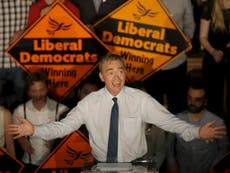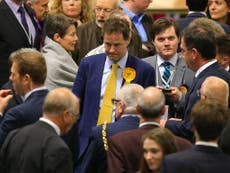The last time the Labour Party swung so hard to the left it gave Britain’s political centre a turbo-boost powerful enough for the then leader of the Liberal Party, David Steel, to tell his 1981 party assembly: “Go back to your constituencies and prepare for government”.
Thus far – despite some wishful thinking and rumblings from Labour’s remaining social democrats – history isn’t repeating itself. The elevation of Jeremy Corbyn to the Labour leadership has left some of Tony Blair’s closest allies sulking on the backbenches, and they are now said to be “in conversations” with the Liberal Democrat leader Tim Farron.
Others are too dazed and confused to know what to do; a third group is along for the ride in Mr Corbyn’s shadow team, including Lord Falconer and Pat McFadden. That does not suggest an imminent mass defection to Mr Farron’s party. The SDP is not about to be reborn. There is one other very powerful reason why the Lib Dems are unlikely to see much support ebbing away from Labour towards them: the Lib Dems are actually in worse shape than Labour.
Voter ingratitude
Fairly or unfairly – and it was an act of historic ingratitude – voters simply turned their backs on the party during the period of coalition government, despite the excellent service Nick Clegg, Vince Cable and Norman Baker, among others, rendered to their country.
The fiasco over student fees meant the electorate was simply not listening when the Lib Dems tried to advertise positive achievements in government, and their successful efforts in preventing the Conservatives from reverting to type. Taking the working poor out of tax, preserving our role in the European Union and bringing in the pupil premium were policies they were right to be proud of.
The election of Mr Farron to his party’s leadership did not immediately open the electorate’s ears, and the single greatest fact of political life in Britain today is that both opposition parties are weak, a situation that is bad for the country and bad for democracy.
This time last year, each of the main parties had some cause for hope at the 2015 general election, so widely predicted to lead to a hung parliament. Today it is David Cameron who can not only celebrate a personal triumph but also look forward to many years in power as his opponents, outside the SNP’s dominance in Scotland, flounder. He will hardly be able to believe his luck.
A search for members
After a few months in charge, Mr Farron should realise how poor a condition his party is in. Even in the lean years, it could rely on a sturdy base of doughty councillors. Some have survived on a personal vote, based on hard work in their communities. Too many, however, were simply swept away in successive rounds of council elections. With them went the focus of much of their local campaigning.
The loss of MEPs and, of course, being left with just eight MPs mean the party barely functions as a representative body. In the Commons and on national television, it has lost its third party status to the Scottish Nationalists. Ironically, for a party supposedly dedicated to its reform, it is at its strongest in the unelected House of Lords.
A mountain ahead for Farron
As he always knew, then, Mr Farron has something of a mountain to climb. He has admitted that rebuilding the Lib Dem base will take more than one parliament, and he is in this for the long term. He sees himself as roughly taking on the same task that Paddy Ashdown did in the 1990s, taking a broken political movement and transforming it into an effective election-winning machine. That is not a bad model, and one that appeals to his party’s radical, campaigning instincts and, frankly, siege mentality.
Mr Farron struggles to make his voice heard, but when he does, he says the right things on the refugee crisis, on our obligations to the wider world and on the searing inequalities in British society.
He should also pursue some other traditional Liberal Democrat themes – ideas whose time may not have yet come, but which at least represent a distinctive message and are true to this party’s history and values. So we would expect Mr Farron to take his campaigning zeal to the European issue, and speak clearly and unequivocally in favour of our part in Europe, when Labour is sounding equivocal.
Constitutional change
Mr Farron should also put himself at the front of the arguments for real constitutional change – democracy, in other words – when the opportunity arises, as it did earlier this summer over the privileges and role of the House of Lords.
He should not give up on proportional representation either; the further Labour finds itself from power, the more likely it will be to talk to the Lib Dems about this again.
Climate change is another challenge that has not gone away, though the Tories would love to forget about it. Again, an opportunity exists not simply to wail about polar bears but to create a viable plan for a green economy. And there are plenty of urgent social causes to attach himself too, such as the housing crisis.
Radicalism for tomorrow
Yet here Mr Farron’s own radicalism may take him away from the centre ground and into the territory now being rapidly occupied by Mr Corbyn and his shadow Chancellor John McDonnell, and which also has the Green Party’s bicycles parked on the lawn. That is crowded ground and the wrong place to be.
Mr Farron should add to his appeal that small matter so easily overlooked – and forgotten about – by centre-left leaders: economic credibility.
Labour is very likely to abandon that particular field shortly, so an opening will emerge for a party prepared to say that the deficit still needs to brought under control, but is determined to tackle it fairly, as the Lib Dems always were. In opposition, the softly spoken Mr Cable made the Lib Dems the economically sensible party. Mr Farron will be turning up the volume to 11, but he will still find it hard to be heard.




Join our commenting forum
Join thought-provoking conversations, follow other Independent readers and see their replies